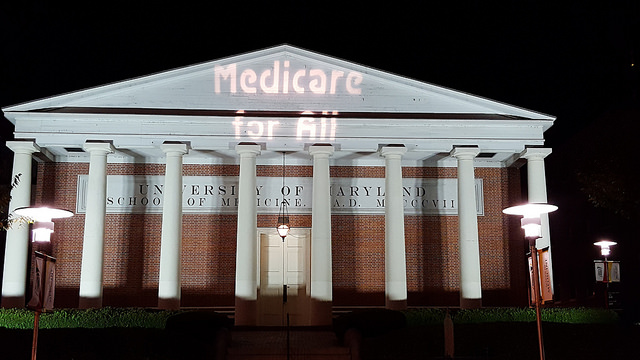In a CNN op-ed, health economist Dean Baker explains why Medicare for All is entirely affordable. Michael Bloomberg and Howard Schultz clearly have not looked carefully at the numbers. To be clear, Medicare for All means improved and expanded Medicare, covering services from most doctors and hospitals anywhere in the US, for everyone, with no out-of-pocket costs and some additional benefits. It means federally guaranteed health insurance as a right.
Baker explains that a number of countries with national health insurance have economies that work well. Countries like Canada, France and Denmark have guaranteed health insurance and as good or better health outcomes than people in the United States. They also have good living standards and high employment rates.
To pay for guaranteed health insurance, more of people’s income in these countries goes to taxes than in the US. But, it is not a lot more. People in the US today pay a private tax to commercial health insurance companies in the form of premiums, deductibles and coinsurance. And, they also pay in lost wages. Employer contributions towards their health insurance premiums–an average of more than $14,000 a year for a family that the worker never sees–would otherwise be income for them. Because Medicare for All will cost less than commercial health insurance overall, you could think of it as a tax cut for most people.
With Medicare for All, national health spending drops, even though everyone is covered. And, there are no premiums, deductibles or other out-of-pocket costs. Medicare for All reins in costs by between $2 and $5 trillion, according to two recent studies. Without commercial health insurance in the mix, we save in administrative waste. And because it would be negotiating on behalf of all 330 million Americans, Medicare can negotiate far fairer hospital and doctor rates. Other wealthy countries spend about half as much as we do per person on health care.
To be clear, proposals that keep commercial health insurance as an option do not rein in costs. They retain all the administrative waste and irrational provider rates that come with commercial insurance. And, while polls suggest that people do not want to give up their commercial insurance, it is hard to believe that they like its restricted networks, delays and denials of care, and high costs. If they understood that Medicare for all gives them wide choice of doctors and hospitals without the high costs and arbitrary delays and denials that come with commercial health insurance, it is reasonable to believe that the polls would show far higher ratings.
The politics will not be simple. But, the logic is compelling. We now need the political commitment to make it happen.
Here’s more from Just Care:
- Four things to think about when choosing between traditional Medicare and Medicare Advantage plans
- New poll reveals most Democrats are willing to pay Medicare for all tax
- New study finds Medicare for all generates overall savings of more than $5 trillion
- Sanders and 15 other Senators introduce Medicare for All bill
- Congressman Larson introduces the Social Security 2100 Act










